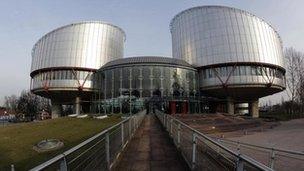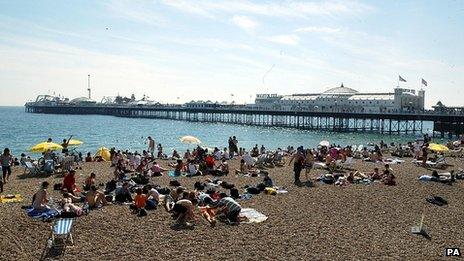UK 'quietly confident' of European Court of Human Rights changes
- Published

The European Court of Human Rights was established in 1959
The government is "quietly confident" it will secure changes to the European Court of Human Rights at a conference this week, Downing Street has said.
Prime Minister David Cameron wants the 47 countries which use the court to limit its ability to overrule cases already determined by national courts.
But a leaked draft of the communique to be discussed at the conference in Brighton reportedly shows the UK's proposals have been watered down.
The two-day event starts on Thursday.
Many MPs oppose the recent decisions by the European Court of Human Rights (ECHR) to prevent the deportation of the radical cleric Abu Qatada and to allow UK prisoners the vote.
They argue it has gone too far in undermining national sovereignty and that some of its rulings could endanger security.
'Corrosive'
The UK currently holds the presidency of the Council of Europe, which oversees the court, based in the French city of Strasbourg.
In a speech in January, Mr Cameron said he wanted to use the Brighton conference to bring in reforms to limit the court's ability to overrule cases already determined by national courts.
He said some rulings were having a "corrosive effect" on people's support for civil liberties.
But The Times newspaper reports that a leaked draft of the communique to be agreed at the council meeting shows a dilution of UK plans to limit the court's scope to take cases already heard in national courts.
It also reportedly would limit the ability of states to ask the court for preliminary opinions in order to avoid many cases ever reaching Strasbourg.
And the newspaper says a requirement for changes to be completed by the end of next year have been struck out.
But Justice Secretary Ken Clarke, who is hosting the conference, told the cabinet on Wednesday that discussions were going well.
'Very productive'
A Downing Street spokeswoman said: "The position we have now is that robust negotiations are ongoing and they have been very productive.
"We are quietly confident of a good outcome at the conference. Getting 47 countries to agree anything isn't straightforward, but there has been a real momentum for change.
"The justice secretary said that there are encouraging signs that we have made significant progress towards a substantial package of reform to the ECHR, which will hopefully realise the ambitions set out by the prime minister in Strasbourg in January."
The spokeswoman declined to comment on the leaked draft, but said: "Where we have got to is a good place. We have had very productive negotiations and there are encouraging signs that the vision which the PM set out in his speech will be delivered."
An earlier draft version of the Brighton Declaration - released in February - said the European Convention on Human Rights should be rewritten so that it includes two key principles.
One was "subsidiarity", meaning that legal decisions should be taken at the lowest levels possible.
The other was the "margin of appreciation" - that national governments should have greater leeway in applying the judgements of the court.
Opponents, including the human rights group Amnesty International, argue such changes will endanger access to justice in countries including Russia - which provides the largest number of cases for the court - and Ukraine.
- Published5 February 2015
- Published5 February 2015
- Published29 March 2012

- Published25 January 2012